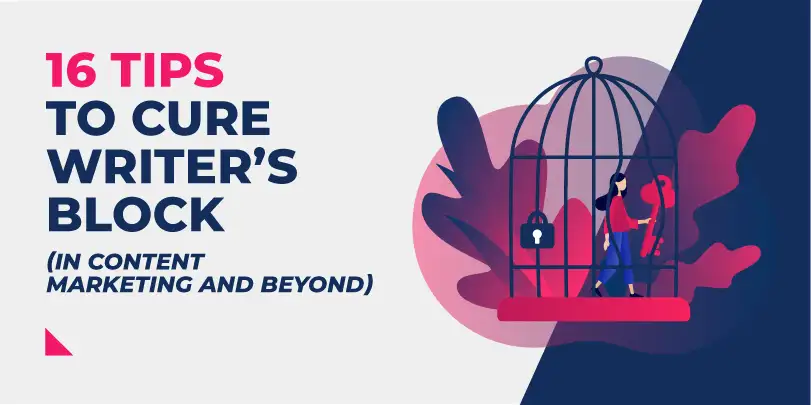
16 Tips to Cure Writer's Block (in Content Marketing and Beyond)
So you work in content marketing and you have writer’s block. We’re guessing that’s why you’re here. You have your task, you're sat primed and ready to write yet nothing is coming out — the well is empty. Even worse... you might be avoiding sitting down at the laptop altogether, instead wasting your time with meaningless tasks just to avoid that dreaded keyboard. And it’s painful.
Fortunately, you’re not alone. Writer’s block can strike at the worst times when you’re writing content for a digital PR or SEO agency, whether you're having trouble crafting the perfect press release, can't quite think of an optimised H2, or are stuck with your blog introduction. The challenges of appealing to clients as well as having to write about topics that might not be your specialist subjects mean that it can often be hard to write anything at all.
To help you through this hiccup in your writing career, we’ve collated 16 tips, divided into three categories:
1. The functional
2. The technical
3. The mental
The Functional Writer’s Block Tips
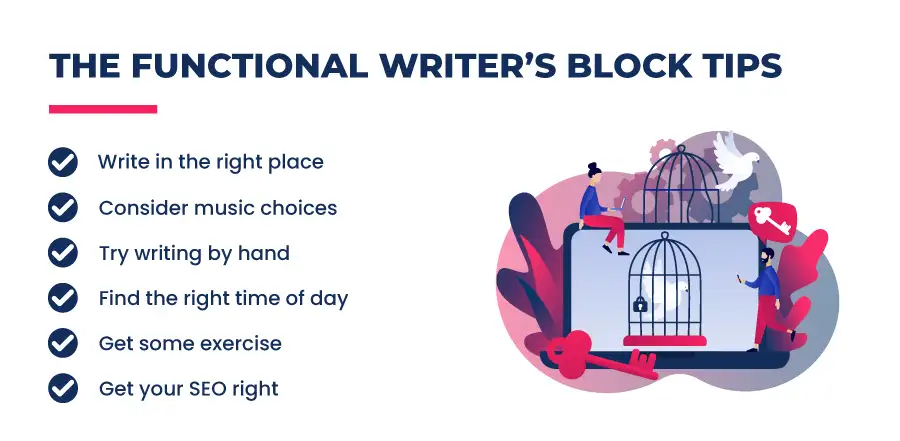
The Right Place
Tackling writer’s block starts long before you’ve sat at your desk and opened your laptop. You first need to consider where you want to write. Ideally, it should be a place that is quiet, comfortable, and allows you to feel confident and focused. Remove any distractions, put your phone away, turn off the television, and get rid of any clutter. Consider lighting, chair comfort, and even temperature, as anything that doesn’t quite feel right will throw you off your game.
A space that ticks all of these boxes is hard to find, so consider experimenting. If you’re struggling to focus in your typical workspace, then try somewhere else. A different part of the house, a coffee shop — even the pub: just find anywhere that will stir up those creative juices.
With more and more companies abandoning traditional offices for remote working, it can be hard to maintain as much concentration and discipline, two crucial requisites for good writing. But, there are many techniques you can use to stay positive whilst working from home and make sure you're at your most productive.
Consider Music
This one is a matter of personal preference. Some people love to write to music while others find it a needless distraction. Whether you are trying to decide what to listen to while you write, or whether to listen to anything at all — it is worth considering all the options. If you typically write with music, but no words are appearing on the page, then try turning those speakers off. The tranquillity of the silence may just offer that sense of peace and clarity that you require. This can also work the other way around, with a jolt of music offering some much-needed energy.
Sometimes, it is good to have a particular song to play every time you start writing, like a boxer striding out to their own personal ring walk music. The repetition of this each time you write will eventually help trigger the feelings that you want to tap into while you work.
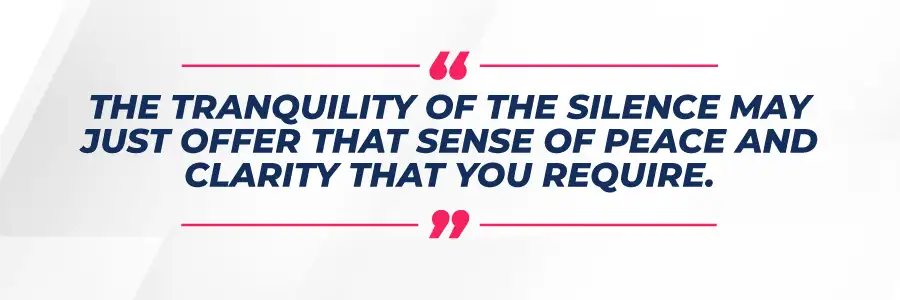
Time of Day
If writing for pleasure, it is important to know which times of day you feel at your most energised. Trying to shoehorn a writing session at a time of the day when you feel lethargic and unmotivated will only result in disappointment as you fail to achieve your goals.
Try and track your mood levels throughout the day and think about the times when you feel at your most productive. It might be first thing in the morning, last thing at night, or somewhere in between. Once you’ve identified this point in the day, try and keep it free to write.
While this may be more difficult when writing is your career, you can still find ways to work around it. Try to organise some meetings for the afternoon and leave the morning free if that's when you're at your most creative, or take lunch a little earlier and devote your early afternoon to getting those words on a page.
Get Some Exercise
There is nothing worse than when writer’s block has set in, and the merciless blank page is staring back at you. Taunting you with its sheer lack of content.
Get away from it!
Go for a walk during your lunch break, take the dog, get some fresh air, or even break out into a run — anything to get away from that document. As the pressure subsides, and the blood is flowing, ideas and structures will appear more naturally, giving you valuable fuel for when you do battle once again with that blank page.
Think in Ink
Once again, it is a case of altering your behaviour until you find something that works. One option is to ditch the new-fangled technology and go old school, making use of the trusty pen and paper. The slower pace of handwriting can give more time for ideas to brew and develop, compared to the rapid-fire nature of typing. It may take longer, and you’ll be left with a worn-out hand by the end, but sometimes returning to this tried and tested classic can remind you why you wanted to write in the first place.
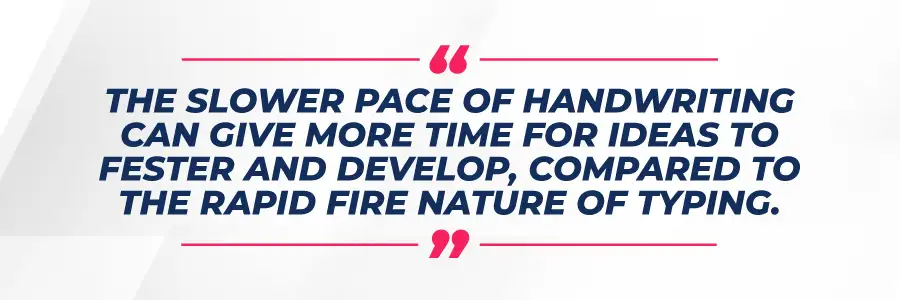
Get Your SEO Right
Have you ever worked tirelessly on a blog post, just for it to garner ten or so site visits? If so then this might be playing into your writer’s block, as there are few things more demotivating than pouring your heart and soul into a piece of work just for it to go unnoticed.
By nailing the SEO basics for bloggers, it means that your work will be read by more people, encouraging you further to write for this growing audience. Before writing your blog post, conduct keyword, and user intent research to get a better understanding of what your target audience is really searching for. After all, you won't be able to get your blog ranking well for the keywords that people are searching for if you don't match what they're hoping to find. Making sure you know how to create user-friendly content can also get you on your way to upping those visitors. Google wants to rank pages that are genuinely useful, so doing the most to achieve this will see you rewarded in the SERPs.
The Technical Writer’s Block Tips
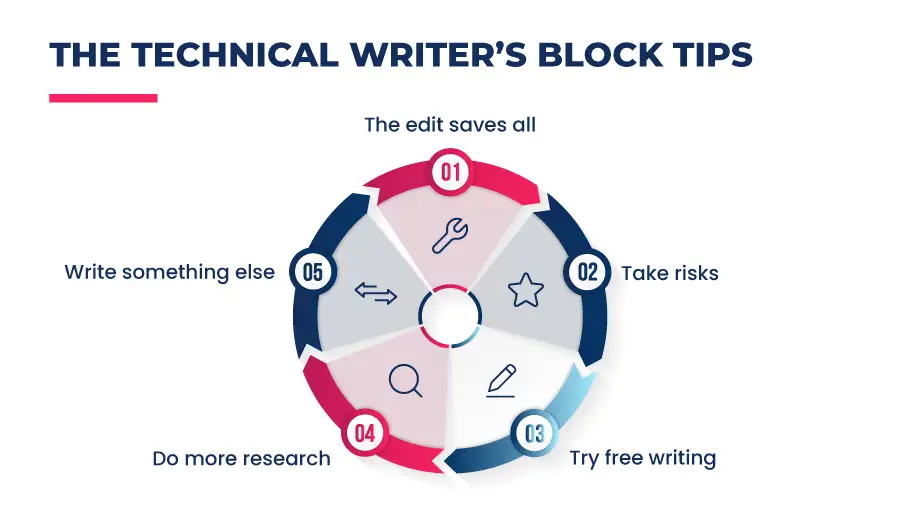
The Edit Saves All
Once you’ve sorted the wheres, the hows, and the whens of your writing, it’s time to finally get down to the sticky process of actually putting words to a page. The most important thing to remember when trying to break out of writer’s block is that everything you type can be changed, deleted, and expanded upon at a later point. What you are trying to do with the initial writing process is to get everything that is bouncing around in your head, out onto the page. Let go of that inner critic, turn the filter off, and indulge yourself. It doesn’t matter if your writing is not perfect the first time around; it can all be saved in the edit.
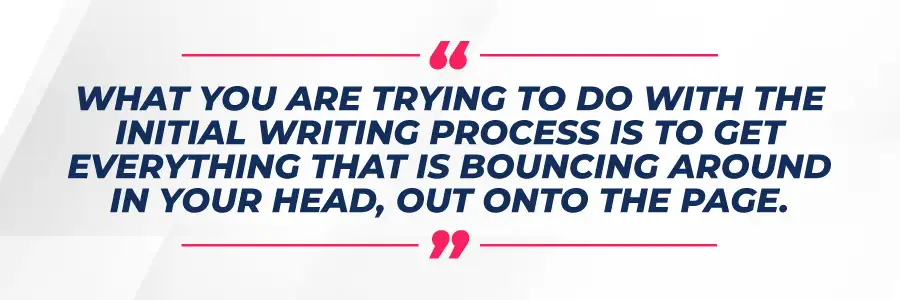
Take Risks
An extension of the last point, allow yourself to take risks with your writing. Keep that sentence, put in that joke even if you’re not sure it lands, and go with that original idea. It’s better to leave it in now than to spend an age deliberating over it, in turn bringing your writing to a standstill. Then once your piece is finished you can go back and see if the risks you’ve taken fit into the general tone and flow of what you’re writing. If they don’t, you can always take them out.
Try Free Writing
Free writing is a great exercise to rediscover your writing mojo. Forget about the constraints of spelling, punctuation, and grammar; just try to write continuously on a certain topic for as long as you can. With no outlines, no parameters, and no beginning or end, you can allow your creativity to run wild.
The likelihood is that what you scribble down will be nothing more than inane ramblings. But within those inane ramblings, there will be ideas, sentences, and nuggets of gold that you can then expand upon when you start the real work.
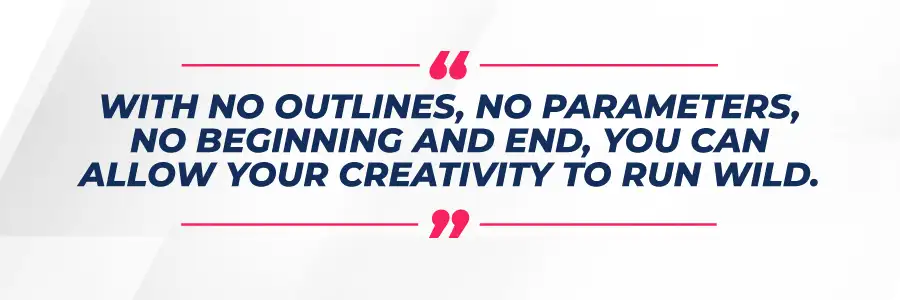
Do More Research
Sometimes we struggle to write because we don’t feel fully confident about the topic that we are writing about. Especially when working for clients whose specialist products may not have previously been on our radar. When faced with this scenario, do extra research to gain a fuller understanding, and then make an ultra-detailed plan. Then the writing process just becomes a case of filling in those gaps between the headings, making it much easier to break down.
To research for writing in digital PR or content marketing, the best place to start is in the search engines. Type in the key terms relating to your topic to see what other sites do well, and what gets traffic. Also, make use of the skills of the people around you. If you are struggling with a particularly complex topic, then get in touch with colleagues whose expertise may give you a different perspective.
Write Something Else
The problem might not be with you, but instead with the piece that you are trying to write. Whether you’re trying to write the novel that will be your magnum opus or attempting to create engaging copy to keep your clients happy – the weight of importance we place on an individual piece of work can be stifling. It becomes easy to catastrophise, to dwell upon the consequences of not bringing your best.
When this feeling sets in, it is worth trying to write something completely different, that has no relevance to the original piece, that will be read by you and you alone. If you typically write non-fiction, have a go at a story. If you’re normally wedded to fantasy, then challenge yourself to write about the mundane. Then once you return to that piece of vital importance, it will feel so much easier. Not only have you got some practice elsewhere, but you are also returning to your specialist subject. This is your bag, this is where you excel.
If you typically write for leisure, then perhaps you should consider launching your content writing career in a digital marketing agency. This would allow you to perfect your writing technique whilst also being part of an exciting and challenging profession.
The Mental Writer’s Block Tips

Set Achievable Goals
Some writers set word targets, for others it is to write for a certain length of time with no interruptions. It doesn’t matter which you choose, as long as it feels achievable. It could be as little as 15 minutes or 200 words. If you decide to stop there then that’s great, you wrote something! Alternatively, when the timer goes you might feel that you’ve finally got your groove on and want to keep going.
The point is that these goals should be achievable. Don’t set yourself the target of writing the next War and Peace in a weekend, as you will only be left dismayed as you fall woefully short. Also, the daunting nature of the mammoth task will likely put you off writing anything at all.
Celebrate Small Victories
It is a common misconception that to build habits, we have to repeat a certain action or task over and over again. However, some behavioural scientists now argue that building habits is more about trying to repeat a specific feeling or emotion.
So, how does that relate to writer’s block? Well, often when we are gripped with that negative mindset, once we finish writing, we scour our text, beating ourselves up over every poorly constructed sentence and missing semi-colon. This builds up anxiety related to writing, these negative emotions leaving a lasting mark, making us fear the next time we have to write.
Instead, once you’ve finished writing, celebrate! Listen to a rousing song that makes you feel good, or jump around like you’ve just scored the winner in the World Cup final. Be proud not that you wrote something good, but that you tried to write at all. That you forewent the temptations and instead committed yourself to this often laborious task. By feeling positive about your achievements, you'll want to write the next day to replicate that emotion once again.
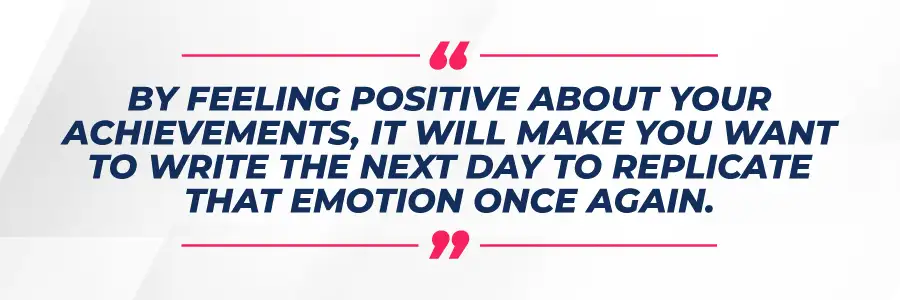
Look After Your Mental Health
When it comes to writing consistently in content marketing, knowing how to stay mentally healthy in the creative industry is vital. If you’re struggling, reach out to the people around you, whether that be friends, family, or even colleagues at work.
Studies have shown that making use of mindfulness techniques can help relieve feelings of stress, anxiety, and depression. Mindfulness is designed to help mental well-being by allowing you to concentrate on what is happening around you. It is a skill that can be perfected by meditating, yoga, tai-chi, or just spending time focusing on your internal thoughts and external surroundings.
Exercising, good diet, and taking time for yourself will all help your mental health, in turn improving your chances of fighting off writer’s block.
Accept Hating Your Writing
In his final letter to Max Brod before dying of tuberculosis, author Franz Kafka asked for all his remaining manuscripts to be destroyed. Kafka was overwhelmed with self-doubt, never aware of his own genius. Yet his novella, The Metamorphosis, which tells the story of a man who awakes one day to find himself transformed into a cockroach, was one of the most acclaimed literary works of the 20th century.
We might never love what we write. We might never truly believe other people’s praise. That’s ok. Writing is often like looking into a mirror, where we hone into the flaws that nobody else sees. It’s a matter of accepting this fact, but ploughing on regardless. What we write may never replicate the ideal text that existed within our minds, but that shouldn’t be the goal. The goal is just to write something, the best something that we can write at that particular time. That’s enough.
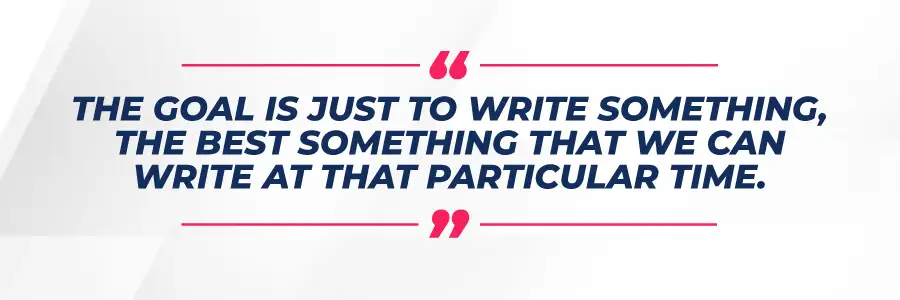
Trust the Process
Writing is an internal battle against a burning desire to shut up. To give up. To believe that your words are of no meaning, no consequence, of no interest to anyone. Ignore those thoughts. Forget about flow states, or finding a rhythm, just try to keep going. Have faith in your abilities, accept your flaws, full of the knowledge that with every sentence, paragraph, article, and chapter, improvement will come.
Beating the Block
Writer’s block isn’t something that can be vanquished once and for all. It’s a matter of perseverance and patience. Of returning to that document time after time even if you fear nothing is going to come out. Even if you feel that you’ve beaten it once, it can emerge and re-emerge again. Whether you are writing for a client, publication, or just yourself, make use of these 16 steps to try and break free of the troublesome writer’s block in content marketing and beyond.
Page Updated - What Has Changed?
In the interest of pursuing perfection, we have updated some aspects of this blog post to correct grammatical errors and to include updated links.
